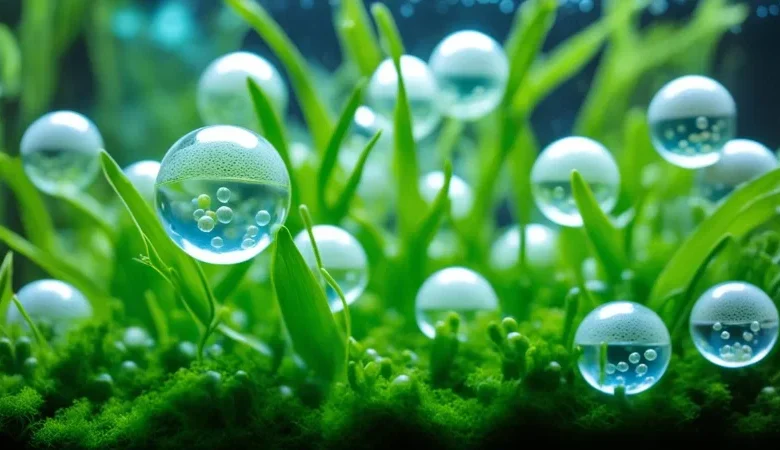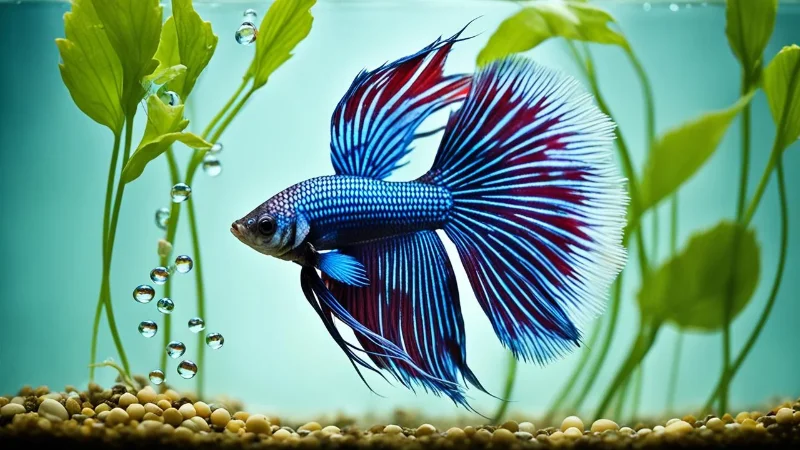
Have you ever wondered if betta fish lay eggs? It’s time to uncover the truth about the fascinating reproductive journey of these mesmerizing creatures. Betta fish, also known as Siamese fighting fish, are renowned for their vibrant colors and breathtaking fins. But what lies beneath the surface? Do betta fish possess the ability to lay eggs and bring new life into the world? Let’s dive into the depths of their reproductive process and discover the secrets of betta fish eggs.
Contrary to popular belief, betta fish do lay eggs. However, the process is far from simple. Betta fish have a unique reproductive system that involves intricate behaviors and careful care of their eggs. In this article, we will explore the journey of betta fish eggs, from their appearance to the hatching process. Along the way, we will also debunk common myths and misconceptions surrounding betta fish reproduction.
So, are you ready to explore the world of betta fish eggs? Let’s embark on this awe-inspiring adventure together and uncover the wonders of betta fish reproduction.
Understanding Betta Fish Reproduction
In this section, we will delve into the fascinating world of betta fish reproduction. Betta fish, also known as Siamese fighting fish, have a unique reproductive process that involves multiple stages and fascinating behaviors.

First, let’s explore how betta fish reproduce. Betta fish are egg-layers, which means that they lay eggs rather than giving birth to live young. The reproductive process begins with courtship, where the male fish initiates an elaborate display to attract the female.
Once the female is ready to mate, the pair engages in a mating ritual known as the “nuptial embrace.” During this embrace, the male wraps his body around the female and fertilizes the eggs as she releases them. It is essential to note that betta fish practice external fertilization, where fertilization happens outside the female’s body.
After fertilization, the female betta fish gathers the eggs in her mouth. Some species of betta fish, known as mouthbrooders, hold the eggs in their mouths to protect them until they hatch. This unique behavior ensures the survival and well-being of the eggs by providing them with the necessary care and protection.
The factors that influence betta fish reproduction are numerous. Water conditions, temperature, and the availability of proper nutrition play vital roles in the reproductive success of betta fish. Additionally, the compatibility between the male and female bettas, as well as their overall health and age, can impact the breeding process.
Understanding the reproductive behavior and process of betta fish is essential for betta fish breeders and pet enthusiasts. By gaining insight into their mating behaviors and the factors that influence their reproduction, individuals can better care for their betta fish and potentially encourage successful breeding.
The Fascinating World of Betta Fish Eggs
When it comes to betta fish reproduction, their eggs play a crucial role in the continuation of their species. In this section, we will explore the enchanting world of betta fish eggs and delve into their appearance and unique reproductive behavior.
The Appearance of Betta Fish Eggs
Betta fish eggs exhibit remarkable characteristics that make them truly fascinating. Typically, betta fish eggs are small and translucent, ranging in size from 1.5mm to 2.5mm. Their shape is round and slightly elongated, resembling tiny pearls. The color of the eggs can vary, depending on the genetic characteristics of the individual betta fish. They can be white, yellow, orange, or even a deep red.

Mouthbrooder Betta: A Unique Reproduction
Among the betta fish species, there is a remarkable reproductive behavior called mouthbrooding. Mouthbrooder bettas, usually the male, take on the responsibility of caring for the eggs. After the female betta lays her eggs, the male scoops them up in his mouth, where they develop and hatch. This unique behavior showcases the extraordinary bond between the male betta and its offspring.
The Egg-Laying Process of Betta Fish
The egg-laying process of betta fish is a fascinating journey that involves multiple stages and the active participation of both the female and male bettas. From the release of the eggs to their fertilization, each step plays a crucial role in ensuring the successful reproduction of these magnificent fish.
When it comes to betta fish, the female is responsible for initiating the egg-laying process. She carefully prepares a bubble nest on the water’s surface, constructing it from bubbles and saliva as a safe haven for the eggs. Once the nest is ready, the female releases the eggs into the nest, where they will be protected and nurtured.

As the eggs are released, the male betta swiftly moves in to fertilize them. He carefully embraces the female, triggering her to release the eggs and simultaneously releasing his milt to fertilize them. The male’s role is critical in ensuring a successful fertilization process.
After the eggs have been fertilized, the male takes charge of guarding and caring for the nest. He diligently tends to the eggs, ensuring their protection from potential threats and maintaining the nest’s integrity. The male betta carefully guards the bubble nest, constantly monitoring the eggs and making necessary repairs if any damage occurs.
The egg-laying process of betta fish is truly a marvel to behold. From the female’s release of the eggs to the male’s attentive care and protection, each step is vital in the survival and development of the next generation of bettas. Understanding this process allows us to appreciate the beauty and complexity of betta fish reproduction.
Caring for Betta Fish Eggs
Proper care is crucial for the health and development of betta fish eggs. By creating optimal conditions and understanding the male betta’s role in egg care, you can increase the chances of successful hatching and nurture a new generation of beautiful bettas.
Optimal Conditions for Betta Egg Health
To ensure the best possible environment for betta fish eggs, pay attention to the following factors:
- Water temperature: Maintain a stable temperature between 78-80°F (25-27°C) using a reliable aquarium heater. Sudden temperature fluctuations can be harmful to the eggs.
- pH levels: Keep the water pH within the range of 6.5-7.5. Test the water regularly and make necessary adjustments using pH stabilizers if needed.
- Water quality: Maintain a clean and properly filtered tank to ensure optimal water quality. Regular water changes, around 25% every week, help remove waste and maintain healthy conditions for the eggs.
Providing the ideal conditions for betta egg health increases the chances of successful fertilization and hatching, as well as the overall well-being of the fry.
The Male Betta’s Role in Egg Care
Male bettas play an essential role in caring for the eggs. After the female betta has laid the eggs, it is crucial to remove her from the tank to prevent her from eating them. This is when the male betta takes over the egg care duties.
The male betta will carefully collect the eggs in his mouth and create a bubble nest at the water’s surface. He will meticulously guard the nest, ensuring the eggs remain safe from predators and monitoring their development.
During this period, it is essential to provide the male betta with a stress-free environment. Minimize disturbances and maintain consistent water conditions to support his crucial role in egg care.
Betta Fish Eggs: From Fertilization to Hatching
In this section, we will take a closer look at the fascinating journey of betta fish eggs from fertilization to hatching. Understanding this process is crucial for any betta fish breeder or enthusiast who wants to ensure the successful development of these delicate and beautiful creatures.
Fertilization is the first step in the life cycle of betta fish eggs. It occurs when the male betta fish releases sperm over the eggs that the female has laid. The sperm then penetrates the eggs, initiating the process of embryonic development.
Once fertilized, the betta fish eggs undergo a series of remarkable transformations. The embryos develop rapidly within the protective egg casings, and their cells start to divide. Over time, the embryos grow larger and take on more defined shapes.
The incubation period plays a vital role in the development of betta fish eggs. During this time, the eggs are carefully tended to by the male betta fish, who fans them with his fins to provide oxygen and keeps them free from debris. The optimal temperature and water conditions greatly influence the progress of the eggs, ensuring their healthy growth and eventual hatching.
Finally, after days or weeks of incubation, the betta fish eggs hatch, revealing tiny, delicate fry. This moment is truly awe-inspiring for betta fish keepers, as they witness new life emerge from the once dormant eggs.
Factors such as water temperature, water quality, and the nutritional state of the parents can impact the hatching success rate of betta fish eggs. It’s essential to provide a suitable environment and ensure the male betta’s continued care throughout the incubation period to maximize the chances of successful hatching.
By understanding the process of fertilization to hatching and taking appropriate measures to support and protect the eggs, betta fish breeders can have the joy of witnessing the incredible transformation of betta fish eggs into vibrant, lively fry.
Myths and Facts About Betta Fish Pregnancy
There are several common misconceptions surrounding betta fish pregnancy that can lead to misunderstandings about their reproductive process. In this section, we will debunk these myths and provide accurate information to help you better understand betta fish reproduction.
Common Misconceptions
One of the most common misconceptions is the belief that betta fish undergo pregnancy like other live-bearing fish species. However, the reality is that betta fish do not experience internal gestation; instead, they practice external fertilization. This means that the female betta releases her eggs into the water, and the male betta fertilizes them externally.
Another misconception is that betta fish lay eggs only once. In fact, female bettas can lay eggs multiple times throughout their lives. It’s important to note that betta fish do not have a fixed breeding season, and their reproductive activity can be influenced by various factors such as water conditions and availability of suitable mates.
External Fertilization: Dispelling Misunderstandings
External fertilization is a fundamental aspect of betta fish reproduction. This process involves the female betta depositing her eggs in a carefully constructed bubble nest, which is prepared by the male betta. Once the eggs are released, the male betta fertilizes them, and the male then assumes the primary responsibility of caring for the eggs and maintaining the nest.
Contrary to popular belief, the male betta does not harm the eggs but plays a vital role in protecting and ensuring their development. He diligently tends to the nest, maintaining the water quality, and removing any eggs that are unfertilized or damaged.
Understanding the truth behind these misconceptions and the process of external fertilization is crucial for providing appropriate care to betta fish during their reproductive cycle. By dispelling these myths, we can better appreciate the beauty and complexity of betta fish reproduction.
Conclusion
In conclusion, understanding the reproductive process of betta fish and providing proper care to betta fish eggs is essential for their well-being. Throughout this article, we have explored the fascinating world of betta fish reproduction, from the appearance of their eggs to the hatching process.
By recognizing the unique characteristics of betta fish eggs, such as their size, shape, and color, betta fish enthusiasts can gain valuable insights into the reproductive behavior of these beautiful creatures. Additionally, the remarkable phenomenon of mouthbrooder bettas, where the male betta cares for the eggs in his mouth, showcases the intricate nature of betta fish reproduction.
It is crucial for betta fish owners to provide the optimal conditions for betta egg health, including maintaining suitable water temperature, pH levels, and water quality. Moreover, the importance of the male betta’s role in egg care cannot be overstated. By actively protecting and nurturing the eggs, the male betta ensures their survival and increases the chances of successful hatching.
Witnessing the hatching of betta fish eggs is a truly awe-inspiring experience. The magic and wonder of seeing the tiny fry emerge from their eggs are a testament to the beauty of nature. By following the guidelines discussed in this article, betta fish owners can enhance their understanding of betta fish reproduction and create a nurturing environment for their beloved pets.
FAQ
Do betta fish lay eggs?
Yes, betta fish do lay eggs. They are a species of fish that reproduce through external fertilization, where the female releases eggs and the male fertilizes them outside of her body.
How many eggs does a betta fish lay?
Female betta fish can lay anywhere from 20 to 500 eggs, depending on various factors such as age, health, and breeding conditions.
How long does it take for betta eggs to hatch?
Betta fish eggs typically take around 24 to 48 hours to hatch. The exact duration may vary depending on water temperature and other environmental factors.
Can male betta fish lay eggs?
No, male betta fish do not lay eggs. Only the female bettas have the ability to release eggs, while the males play a crucial role in fertilizing and caring for the eggs.
How do I care for betta fish eggs?
To care for betta fish eggs, it is essential to maintain stable water conditions with proper temperature, cleanliness, and adequate oxygenation. Providing a suitable breeding tank and monitoring the eggs’ development is also crucial.
How do betta fish eggs hatch?
Betta fish eggs hatch through a process called incubation. After the eggs are fertilized, they undergo a period of development where the embryos grow inside the eggs. Eventually, the embryos will hatch, giving rise to tiny betta fish fry.
What is external fertilization, and what are the misconceptions associated with it?
External fertilization is a reproductive process where eggs are fertilized outside of the female’s body. Some misconceptions associated with external fertilization in betta fish include mistaking it for pregnancy and assuming that the male betta carries and nurtures the eggs, which is not the case.



